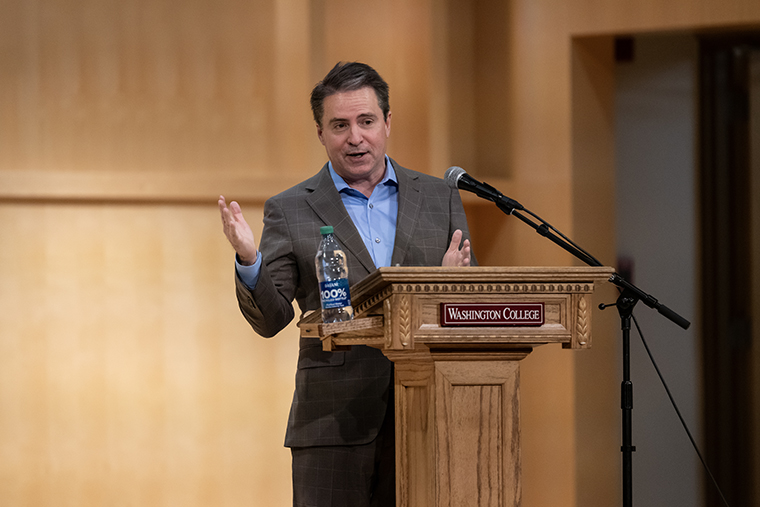Robert P. Jones Calls for a Deeper Look at Origin Stories of White Supremacy
The New York Times bestselling author discussed his newest book, The Hidden Roots of White Supremacy, and answered questions from students and community members at November event on campus.

The Louis L. Goldstein Program in Public Affairs and the Office of Diversity and Inclusion at Washington College sponsored a talk on Nov. 16 from the Public Religion Research Institute (PRRI) founder and president, Robert P. Jones, to discuss findings from his new book, The Hidden Roots of White Supremacy and the Path to a Shared American Future, at Washington College.
Christine Wade, Louis L. Goldstein Professor of Public Affairs and chair of the political science department, mentioned in her introduction of Jones that Washington College has recently seen instances of white supremacy propaganda popping up around campus and noted the need for increased opportunities for white Americans to better understand the issue of whiteness.
“When we learned the National Justice Party was making their presence known on our campus…I knew just who to call,” said Wade.
In opening the talk, Jones noted the recent move in our society to discuss the concept of national origin stories, highlighting the work of the 1619 Project and more, which provide the narrative of the history of the United States through a wider lens and not one that is predominantly white.
“We are clearly in an age of reckoning and dealing with this history, though not very well,” said Jones.
Jones’ latest work tracks the story of white supremacy in America back to 1493, when Columbus sought Papal approval to colonize the New World, bringing about the issuance of a document that would lay the groundwork for racist policies and atrocities, which were rooted in approval from the Christian church. The book also examines contemporary communities in Mississippi, Minnesota, and Oklahoma for models of racial repair to help chart a new course toward a genuinely pluralistic democracy.
Jones, who was raised in the Southern Baptist church, noted the continued problems with race in modern Christian thought and practices.
“In white evangelical world, we’re seeing a real doubling down,” he said, noting that in his lifetime the only thing the Southern Baptist leaders deemed important enough to put out a joint statement on was on a call to fight the use and teaching of critical race theory.
When asked about his feelings on restitution and, specifically, what those who are white can offer as an apology that might be accepted by African Americans, Native Americans and other minorities, Jones called for an “unleashing of creativity” and recounted an example of a small town outside Seattle where locals voted to start giving a percentage of their mortgages and rents to a non-profit fund that aims to provide housing cost assistance to descendants of Native Americans whose lands and property were seized and stolen in the area generations before.
“We could do more of that,” Jones said. “We were creative in defrauding them so we should be creative in [bringing about] restitution.”
In the end, Jones called for a deeper understanding of what work must be done to repair the damage caused by white supremacy.
“If we want to have moral integrity, then we have to be able to look in the mirror at what we have been," he said. “I think people who look like me have historically thought of this ‘project’ as an altruistic thing... but it is about saving our own integrity.”
In addition to co-sponsoring the event, the Office of Diversity and Inclusion donated 50 copies of Jones’ book to attendees of the talk.
“I was happy to collaborate with Christine Wade and the Goldstein Program to co-sponsor Robert Jones's lecture and provide free copies of his new book to attendees,” said Alisha Knight, associate provost for diversity & inclusion and professor of English and American studies. “Some segments of the campus have been on edge—justifiably so—since propaganda for a white supremacy group started appearing around campus and in town in August. I think Jones' lecture, and his research more broadly, offers a timely counterpoint. And the event, which went off without a hitch, demonstrates the possibilities for engaging with difficult topics like whiteness. I hope we all can find the courage to engage on an even deeper level in the future.”
The talk, which was hosted in Hotchkiss Recital Hall in the Gibson Center for the Arts, was followed by a Q&A with the author and a reception sponsored by the Starr Center for the Study of the American Experience.
Mackenzie Boughey '24 appreciated how the lecture addressed the exploitative foundations of the United States.
“This history, as uncomfortable as it is, must be acknowledged in order to properly understand how systematic racism still persists," Boughey said. "I agree with Dr. Jones that we must be willing to challenge our own biased conceptions of the past, as this explicitly reveals how white nationalism has shaped and continues to shape our country.”